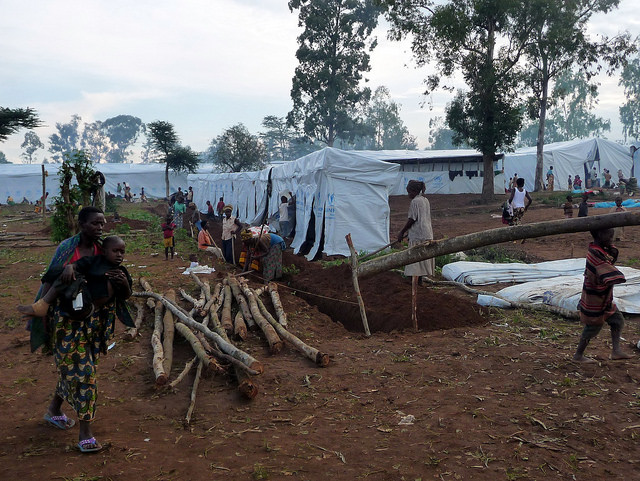The Syrian civil war has forced millions of people to leave their homes over the past five years, throwing the issue of refugees to the forefront of public debate. Though far from being a new phenomenon, this has led to renewed interest in the question: what is the economic impact of refugees on host countries? A new study conducted by IFPRI, the University of California, Davis, and the United Nations World Food Programme (WFP) and published in Proceedings of the National Academy of Sciences sheds some new light on the question. Nine out of ten (86 percent) of the world’s refugees are hosted by less-developed countries, many of them in camps. We studied three refugee camps in Rwanda, and found that refugees can benefit the host country’s economy.
Most of us might imagine life in refugee camps to be helpless, passive, and entirely reliant on handouts. But if allowed to do so, refugees can lead vibrant economic lives: they work, trade, and set up businesses, creating economic linkages both within and around the camp. In addition, refugees who qualify for aid transfers use them to make purchases, which injects cash (or food if the aid is in kind) into the economy.
Our study shows that refugees can, at least in some cases, increase real income when they are given the opportunity to interact with the surrounding economy, and that these benefits can be larger when refugees receive aid in cash rather than in kind. To study this question, we gathered economic data from three refugee camps in Rwanda, and from a 10-kilometer radius area around each camp, capturing most of the economic transactions of refugees. We analyzed data on the income sources, spending patterns, farming practices and output, business revenue and expenses of both refugees and locals, using these to calibrate a Local Economy-wide Impact Evaluation model (LEWIE) of each camp and its surrounding economy. The models were used to simulate the impact of an additional refugee entering the camp.
Each additional refugee generated increases in real incomes that were greater than the cash aid they received. For the two camps where refugees received cash transfers (totaling $135 and $127 respectively), the increase real incomes within the 10-km radius was more than $200 ($205 and $253). This number reflects the spillover to local farmers and businesses ($70 and $126), as well as increased trade with the rest of the country outside of the 10-km radius economy ($55 and 49$).
Impacts were less dramatic in the third camp, where refugees received most of their transfers in food aid. The food is often traded for cash, which can stimulate demand. But since this type of aid can also undercut sales by local food suppliers, the overall economic benefits were reduced. Nevertheless, transfers amounting to $120 generated a total of $145 in real income within the radius.
So what about Syrian refugees in Europe or in camps in the Middle East? We need to be cautious: Extrapolating specific numbers from a study of Rwandan refugee camps to other areas of the world would be ill-advised. Positive spillovers through refugee consumption can only materialize if the host economy has the resources to expand supply and match the demand generated by refugees. There are probably limits to the capacity of an economy to absorb refugees. Nevertheless, our study shows that refugees can be productive contributors to their host economy, and suggests that locking them up in enclosed camps may lead to forgone economic benefits.







